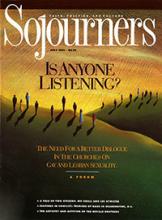If we walk in the light, as God is in the light, we have fellowship with one another, and the blood of Jesus, God's son, cleanses us from all sin (1 John 1:7).
I write as the African-American pastor of a church formed in the contemporary intentional-community movement, which like the gay-lesbian movement partly exists as a reaction to the impoverished common life that prevails in North American churches.
Early in our 20-year history, I put my community to the test as a setting in which to entrust to others my personal struggles with homosexual orientation. Actually, this unfolded in a progression of self-disclosures in widening circles: the pastoral team of elders; my extended family household; our pulpit; therapy training groups; and finally, with my parents. My precedent would be followed by several other men who later joined our common life.
This was a sharp contrast to my prior experience of seeking help in the privacy of individual therapy and spiritual direction. I was discovering the body of Christ as a setting for "coming out," a crucial first step along the path to inner healing and reconciliation, but without the presuppositions of gay culture. This intentional community afforded me and others a way to break out of the confines of loneliness and shame into the footroom of redemptive love and recovered dignity. It was a walking in the light of fellowship toward healing and reconciliation.
Read the Full Article

